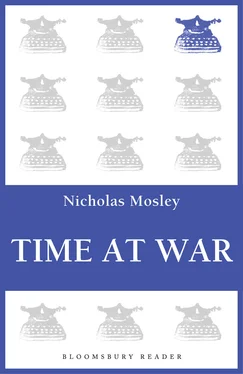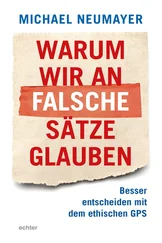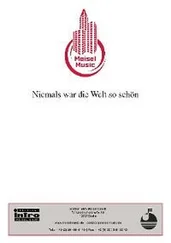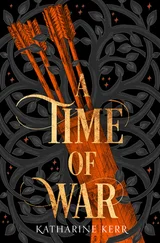My sister became my chief correspondent when I was abroad; I had no regular girlfriend. My sister and I had always been close as children, like orphans in a storm. As I grew older I felt allegiance to my small circle of school friends, but my sister was never excluded from the style and substance of this. From Philippeville I wrote to her –
Last week I was whirled away darkly at dead of night to guard some Italian prisoners, which I found most agreeable, the Italians waiting on me hand and foot, and me eating all the rations. Unfortunately my only companions were the most granite of Scotchmen, whom I found even harder to understand than the Italians. I was followed around by a flock of interpreters. Equally suddenly and darkly I was torn away yesterday, my rule at the prison camp I suppose having been too much like an operatic burlesque for the authorities. As I returned I met Anthony, very complacent in an ambulance, suffering from infectious diarrhoea, no doubt caused by the incredible quantity of food consumed, and complete lack of strength in the muscles. He is away at the hospital now, no doubt very comfortable and keeping the complaint well supplied with material.
Anthony had been my great friend from infant school days, with whom I had volunteered for the Parachute Regiment, and with whom I had even briefly discussed the idea of being taken prisoner.
We were allowed to send home one airmail letter a week, so I wrote to my sister very small on the flimsy paper and asked her to pass on my letters to other members of the family. I added — ‘I doubt if many others will get as far as this without a weary shake of the head, even if you are able to.’
For the rest, my letters were full of the pleasures of a Mediterranean summer holiday — games of rounders on the beach, swimming out to a ghostly half-sunken wreck half a mile out at sea, in the evenings more of the old acting and paper games, then getting lost in the dark on the way back to the tent from the mess. I reported that I had difficulty in communicating with the Italian waiters in the mess because the only line in Italian that I seemed easily to remember was ‘Your tiny hand is frozen’. Then –
I have at last been made to do some work, which is most tiresome. I plod around for miles over the most mountainous country, trying feebly to keep up with more great strapping Scotchmen who I suppose were born and bred upon such hills. How one’s thighs wobble! Anthony is still having the most blissful time in hospital. There is absolutely nothing wrong with him, but they put him into a diphtheria ward by mistake, and so he is now in quarantine. But he is allowed out briefly, so we meet for enormous teas at the café. The latest horror is a plague of toads who have completely occupied our tent and croak furiously throughout the night. We had a great hunt yesterday and found one in my spongebag. Our screams could be heard for miles.
On one trip inland I caught a glimpse of the city of Constantine, which still remains in my mind as one of the most beautiful cities I have ever seen. On a road to the desert one suddenly comes across it glowing on its vast rock surrounded by a deep gorge. It seemed to be a place that war could not touch.
By this time the Allies had landed in Italy — both in the ‘heel’ at Taranto, and above the ‘toe’ at Salerno, from which Naples was occupied on 1 October. Mussolini had resigned in July, and in September the Italian government that had taken over from him had capitulated to the Allies. Then in October, as part of a deal with the Allies which assured it of reasonable terms, the Italian government declared war on Germany. The Allies had wondered if in this event the Germans would retreat from Italy; but instead they reinforced the troops that had withdrawn almost intact from Sicily, and they put up unexpectedly strong resistance at Salerno. They seemed, in fact, ready to fight all the way up the mountainous terrain of Italy. However the Allied landings on the east coast at Taranto had gone smoothly. I wrote to my sister –
Oh the news, the palpitations, the chaos! I am leaving here at 4 a.m. tomorrow morning, in about 7 hours’ time, and I am not packed and all my fantastic amount of luggage is strewn about the place. I know not where I go. In quest of Vivien? [The Vivien was the name of my father’s motor-boat stored in a cave near Naples.] To the place in whose beginning is the home of Scarlett O’Hara?
I will send you a new address as soon as I am at rest. I really must be off, down to the busy sea, ‘but to hear the mermaids singing each to each’? Not B. likely. Down to the squelch of giant squids, to the weary bleat of whales. Give my love to all. It will not be long before, ivy-crowned, I roar through Rome on an elephant.
So in November I set out with one or two others (though leaving Anthony in his hospital) on a troopship to Taranto. As we got close to the war a raging toothache overtook me; this was a calamity that seemed worse than the prospect of war. I learned later that at times of stress it was usually my teeth that savagely objected. There was no dentist on the boat; at Taranto there was one with a drill worked by a foot pedal, and an extraction instrument like a pair of pliers. However he said there seemed nothing organically wrong with my tooth; so i f pain was symbolic, should one not bear it? Perhaps thus death would be made to seem acceptable?
Myself and the group I had been travelling with had been earmarked to go to a Rifle Brigade battalion which had suffered many casualties. But now we learned that this battalion was being sent home, and there were no more Rifle Brigade battalions in Italy, so we were to be parcelled out to other regiments in need of officers. This evoked mock alarm among some of our number: what — officers of a ‘rifle’ or ‘black-button’ regiment landing up with a common-or-garden ‘brass-button’ regiment? One of the Rifle Brigade friends I was with had a brother at Army Group Headquarters; he got in touch with him and asked — ‘Please spare us this indignity, and arrange for us to be sent to some eco-friendly “black-button” regiment.’ The brother said he understood our predicament (army morale was indeed kept up by such niceties) and he said he thought he might be able to get us into the 2nd Battalion of the London Irish Rifles, to be sure a black-button regiment, and which had done much fighting in North Africa and Sicily and was in need of officers. We thanked the brother. We had at least done something to affect our fate.
We moved towards the front line through transit camps referred to by acronyms which I do not now remember: in one of these, somewhere between Taranto and Bari, we got holed up for a month while we waited for our summons to join the London Irish Rifles. One day in the ‘Information Tent’ (so I recorded in the diary I had been keeping) I came across a paragraph in ‘Home News of November 17th’ which announced that ‘Sir O. Mosley is to be released from prison for reasons of health’. My diary reaction to this news was ‘O frabjous day calloo callay!’ And then — ‘It is now imperative for me to get home as soon as possible.’ Did I think in some way that with the release of my father the point of my war was over?
With nothing military to do in the transit camp, and having been encouraged now to dream about the future, I spent time in looking at and writing in my diary, which I had begun at Ranby and in which I had tried to elaborate my ideas about Christianity and the ‘perfectability’ of man that I had written about with such abandon in letters to my aunt and to my father. But I saw how critical and abusive I had been and was being in my diary about many of the people I came across; and in some shame I wrote to my old school friend, Timmy — ‘But I also say such rude things about myself that I can hardly read back without dropping a tear or two about what a horrible person I must be.’ Was this in recognition of the glibness of my ideas about perfectability?
Читать дальше












